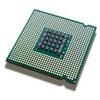In this paper, we propose a cell-free scheme for unmanned aerial vehicle (UAV) base stations (BSs) to manage the severe intercell interference between terrestrial users and UAV-BSs of neighboring cells. Since the cell-free scheme requires enormous bandwidth for backhauling, we propose to use the sub-terahertz (sub-THz) band for the backhaul links between UAV-BSs and central processing unit (CPU). Also, because the sub-THz band requires a reliable line-of-sight link, we propose to use a high altitude platform station (HAPS) as a CPU. At the first time-slot of the proposed scheme, users send their messages to UAVs at the sub-6 GHz band. The UAVs then apply match-filtering and power allocation. At the second time-slot, at each UAV, orthogonal resource blocks are allocated for each user at the sub-THz band, and the signals are sent to the HAPS after analog beamforming. In the HAPS receiver, after analog beamforming, the message of each user is decoded. We formulate an optimization problem that maximizes the minimum signal-to-interference-plus-noise ratio of users by finding the optimum allocated power as well as the optimum locations of UAVs. Simulation results demonstrate the superiority of the proposed scheme compared with aerial cellular and terrestrial cell-free baseline schemes.
翻译:暂无翻译


